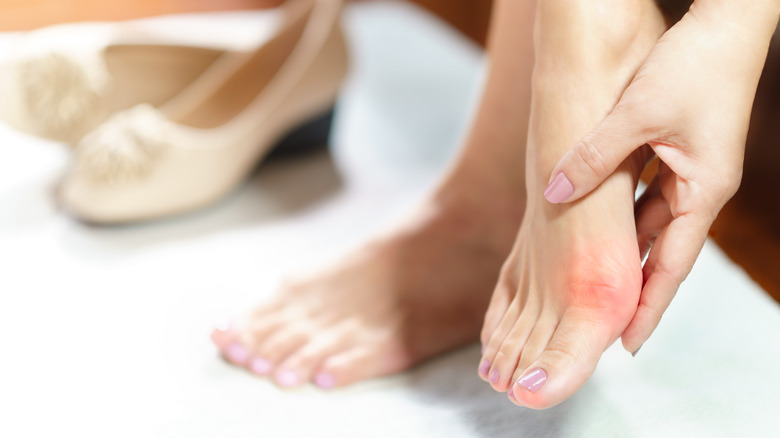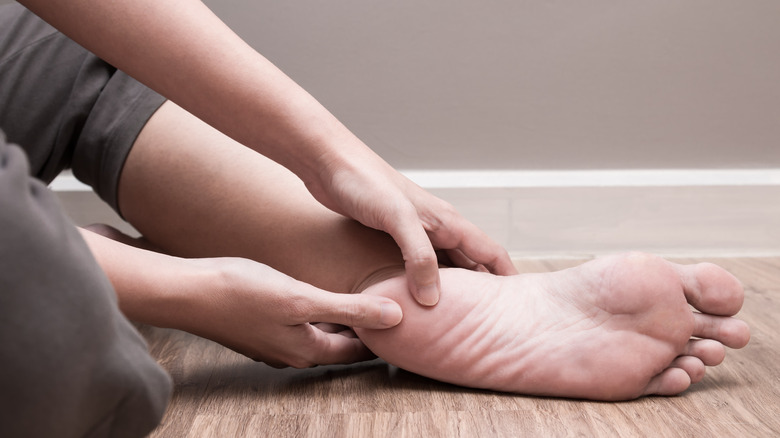The Real Reason You're Having Foot Pain
Foot pain is one of the most common health complaints, affecting 13 to 36% of men and women (per Arthritis Care & Research). Its causes range from prolonged sitting or standing to bone disorders and diabetes. The Mayo Clinic, for example, lists over 30 conditions and diseases that may result in foot pain. Knowing why your feet hurt is the first step to finding a solution.
Moderate-to-severe foot pain, for instance, appears to be more common in those with back, knee, or hip pain. It also tends to affect people who are overweight or obese, have high blood pressure, or suffer from depression, reports the journal Arthritis Care & Research. However, this doesn't necessarily mean that you have an underlying disease. If you wear high heels or ill-fitting shoes, your footwear could be the culprit.
High heels are often to blame for foot pain, says WebMD. This type of footwear may cause bunions, calluses, and painful bone deformities. Moreover, it could lead to stress fractures, pinched nerves, and other conditions that can make your feet hurt, warn the experts at Alliance Foot & Ankle Specialists.
Plantar fasciitis is a common cause of foot pain
If you have constant foot pain, try to determine where exactly it hurts. Pain near the heel, for instance, could be a symptom of plantar fasciitis, says the American Academy of Orthopaedic Surgeons (AAOS). This condition is often due to tight calf muscles or repetitive movements, such as running or jogging. It also tends to affect those who are new to exercise.
People with plantar fasciitis typically report increased pain in the morning and after physical activity. The pain can be felt on the bottom of your foot and may subside after you walk for a few minutes. These symptoms go away within 10 months or so in over 90% of cases, reports the AAOS. Health experts recommend taking a break from running and other activities that put stress on your feet. You may also apply ice on the affected area and take ibuprofen or other nonsteroidal anti-inflammatory drugs to reduce pain and swelling.
In more severe cases, doctors may recommend cortisone injections, physical therapy, or surgery. Some patients also need to wear shoes with thicker soles, soft silicone heel pads, or custom inserts for better support. Make a habit out of stretching your calves and plantar fascia to relieve foot pain, suggests the AAOS.
Stress fractures can make your feet hurt
Foot pain that occurs when you're running, dancing, or playing tennis may be due to a stress fracture, notes the Mayo Clinic. Stress fractures are common in those who engage in high-impact sports, but they can also affect people with flat feet, high arches, or weak bones. A diet low in essential nutrients, such as calcium and vitamin D, may weaken your bones and contribute to stress fractures.
This type of injury causes small cracks in the bones of your feet. The pain may worsen over time and tends to subside during rest, explains the Mayo Clinic. Surgery is only required in severe cases. Stress fractures often heal on their own, but you may need to make some lifestyle changes.
The Mayo Clinic recommends getting plenty of rest until you're fully healed. Increase your activity level gradually and avoid doing too much, too soon, especially when starting an exercise program. When you're having foot pain, apply ice on the affected area for 15 minutes every three hours or so.
Foot pain may be due to an underlying condition
Sometimes, foot pain is a symptom of diabetes, arthritis, Raynaud's disease, or other underlying conditions, explains the Mayo Clinic. Diabetes, for example, can affect your nerves, leading to foot pain, numbness, tingling, and poor circulation. This type of nerve damage is known as diabetic neuropathy (via the American Diabetes Association).
Another potential cause of foot pain is reactive arthritis, a disease characterized by joint pain and swelling. It usually occurs in response to an infection and can affect most joints, including those in your feet. Its symptoms may include localized pain, stiffness, inflammation, rashes, low back pain, and urinary problems, notes the Mayo Clinic. This disease can be acute or chronic, meaning that your symptoms may subside within months or last a lifetime (via the American College of Rheumatology).
As you can see, it's hard to tell what causes foot pain. Your feet may hurt because of an underlying disease, improper footwear, overuse injuries, bunions, and everything in between. Keep an eye on your symptoms and try to identify a pattern. For example, if your feet hurt during exercise, switch to more supportive shoes and avoid running on hard surfaces. Swap your heels for sneakers and see how you feel. Reach out to a doctor if your symptoms persist or worsen.



